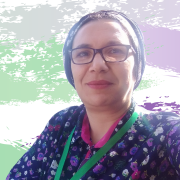

Abonnez-vous aux SCP News
Semia Gharbi: standing up for a toxic free & gender-fair future in Tunisia and the Mediterranean

Throughout their lives, women are significantly exposed to numerous hazardous chemicals which can harm them and which, if pregnant, can be transferred to their babies via the placenta or breast milk. The risk is therefore high both for women and for all future generations.
Furthermore, women are unequal to men when it comes to exposure to certain toxic chemicals and the impact on their health. Household products and personal care products still tend to be used by women, which consequently expose them to hazardous chemicals and can lead to a build-up of chemicals in their bodies, making them more vulnerable.
This is why coordinated efforts are crucial to ensure a toxic-free future for women and their children, who are at greater risk.
In Tunisia, a multifaceted woman stands up for protecting the health of women, youth and future generations. Semia Gharbi is teacher-consultant in environmental science and management, president of the AEEFG (Association of Environmental Education for Future Generations), member of the Tunisie Verte Network and Regional Hub Coordinator for IPEN (International Pollutants Elimination Network) in the MENA / North Africa region.
Towards more prevention, education, information and regulation
She acts on several fronts and she believes in education and access to information as main trigger to a needed change. On the one hand, she campaigns to "dynamite the education system" and integrate into official programs a strong part on current environmental challenges. She highlights: “Education, as information, has enormous potential. If we want to change things, we must endow young people with all the tools to understand the world around them and the environmental challenges they face. They are the future drivers of environmental change”.
The same goes for women and their vulnerability to hazardous chemicals: “Women have the right to be informed about the dangerousness of the products they use every day, everything must be clear, identified and said”. From mercury in mascara, to phthalates in fragrance, to styrene in maxi pads, toxic chemicals in products marketed to women abound. “We are fighting for this on several fronts. One of our role is to raise awareness among women on the risk the so-called Persistent Organic Pollutants (POPs) and other toxic chemicals pose to their health. In parallel, we advocate and we work with national authorities so that they ban certain chemicals”. Today in Tunisia, a growing number of women understands this toxic threat, thanks to these campaigns. She particularly works with rural women's community, who “are at greater risk because they handle dangerous products, pesticides, without being informed of all the risks they face”.
“Our role is also to call on governments to take actions and to vouch for the safety of its citizens”. Among all her actions that she carries out, SCP/RAC had the occasion to join forces with Semia and IPEN in 2018, by implementing a pilot project in Tunisia on the substitution of lead in paint, which was one of the 20 preventive solutions identified by SCP/RAC in a publication on how to prevent the use of toxic chemicals frequently found in the Mediterranean. The pilot project consisted in encouraging policymakers to support industries in the transition to non-toxic alternatives, an essential step in the transition to circular economies.
A meeting had been organized in Tunis, bringing together Tunisian and foreign economic operators in the industrial painting sector for an exchange of experiences and business meetings, decision-makers from the various ministries concerned, and representatives of research centers and universities.
Semia welcomed the collaboration with the centre: “Thanks to this collaboration, we were able to bring together the most essential actors around the same table, including the ministers. This meeting gave body and breadth to the research work that we had been leading for 5 years with IPEN on this thematic. It has been a real success, a boost. It allowed us to accelerate the work process and to start on a lasting basis, which even today allow us to move forward and to concretize this project which should soon lead to the proposed law. It was about bringing the right people together and to lead the debate, and SCP/RAC perfectly performed it”. She adds: “if we really want to change things in the Mediterranean, this type of alliances must be made”.
As a result of this collaborative work, a law is in preparation, concerning not only lead, but also integrating other dangerous toxic products which are found in industrial paint. “The situation with the covid has delayed us somewhat but we are confident about the proposal of this law, which will be tabled by the Ministry of Environment”.
This is neither the first nor the last achievement to which she has contributed. More recently, through the Réseau Tunisie Verte, she has partnered with other NGOs to demand the immediate return of containers filled with mixed municipal waste that were illegally exported from Italy to the port of Sousse. In parallel, in February 2021 and through her association AEEFG, she also calls for the withdrawal from the Tunisian market of imported products containing carcinogenic talc, a product that is already withdrawn from the market in its country of origin and in Canada.
“We want to draw the authorities' attention to the issue of double standards: how does a product banned in the country of origin can be sold in other countries?”. In any case, nothing will stop Semia from advocating for a better future, whether through research, science, education or awareness raising among young people and women. She concludes: “It is our role to prepare new generations and women for the environmental challenges of today and tomorrow”
Toxic Chemicals: about SCP/RAC’s mandate
SCP/RAC, as Regional activity centre of the Stockholm Convention on Persistent Organic Pollutants, has a special mandate to assist the Mediterranean countries in phasing out toxic chemicals and transition to safe and innovative alternatives, and to encourage responsible consumption and production among consumers, businesses, entrepreneurs and civil society organizations in the Mediterranean region.
Raising awareness on the risk that Persistent Organic Pollutants and other toxic chemicals pose to human health and the environment is also one of the mission of SCP/RAC. We also work at forging connections between the global and regional levels and between different kind of actors (experts, civil society, policy makers) to provide interesting opportunities to lead the transition to non-toxic and safe circular economies.














